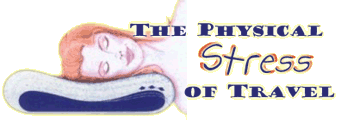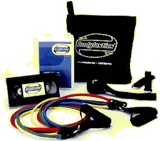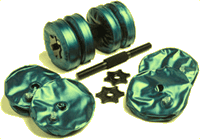 |
 |
 |
|
|||

The Physical Stress of Travel
You can find the cheapest airfare, snare the best seat on the plane, and find a hotel bargain. But if you're a frequent traveler, that's just half the battle. We considered some options for relieving some of the physical stress, too. 
I was talking to a chiropractor the other day who told me something scary: there's about 25 times more pressure on your spine when you're sitting than when you're lying down. Which explains why I enjoy napping so much more than sitting at my desk working. This chiropractor, Dr. Marc Feldman of Washington, D.C., says when you're driving long distances or on a train or plane, you should keep a pillow behind the small of your back. In flight, get up and walk the aisle every hour or so. Find a spot where you can reach down and touch your toes. Stretch and stand on your tiptoes and reach for the sky. If you're trapped in your seat, adjust your posture, regularly shifting weight to different parts of your body. If your feet don't touch the floor, build yourself a foot rest with a piece of luggage or stack of blankets. And use one of those U-shaped, neck support pillows if you like to sleep while flying. Luggage can be a killer. Even carrying a ten-pound bag, keep in mind the average laptop weighs eight pounds, from a ticket counter to a departure gate can put major stress on your spine. Feldman says use a luggage cart or luggage with wheels. When you pick up checked baggage from a carousel, don't grab and twist as most people do. Get in front of the bag at a slight angle, pick it up and immediately set it down. There are hotel beds out there waiting to hand you a sleepless night. Don't settle for an uncomfortable bed. Ask for another room. If you need to, put the mattress on the floor and sleep there. Be realistic about rental cars, too, if you're a large person, don't try to cram into a sub-compact. On a long road trip, change the position of your seat now and then. 
If you'd like help in creating a personal work-out program on the road, visit the web site eFit.com. Type in your name and stats and mention you're a frequent traveler who has difficulty staying in shape on the road. E-Fit's physical therapists, chiropractors or personal trainers will work out a program that will allow you to tote that laptop easily. Many hotels have fitness centers, but even with the best of intentions, a lot of us never quite get around to visiting them. Another way to work out, though, is by bringing exercise gizmos that can fit easily in your suitcase. For example, there's something called Bodylastics, four different colored, rubber tentacles with an array of hooks and handles. You use it to work your lower and upper torso. Cost: $35 from bodylastics.com. It promises it's a "self-esteem booster," though it's my waist I'm more worried about than my self-esteem. How about portable weights? Now why didn't I think of this--plastic weights you just fill with water wherever you want. If you drop'em on your hotel floor, no one will even hear them. They're about 50 bucks. And, of course, there's that old fashioned way of getting aerobic exercise, the jump rope. Now I know all about the siren call of the mini-bar. Those candies and nuts beckon you, whispering, "Turn on the tube, find an old movie. Eat, drink . . . indulge." But as my mother used to say: the only one you're hurting is yourself. So stretch out and work out. You'll arrive home in better shape. |
 | American Public Media Home | Search | How to Listen ©2004 American Public Media | Terms of Use | Privacy Policy |